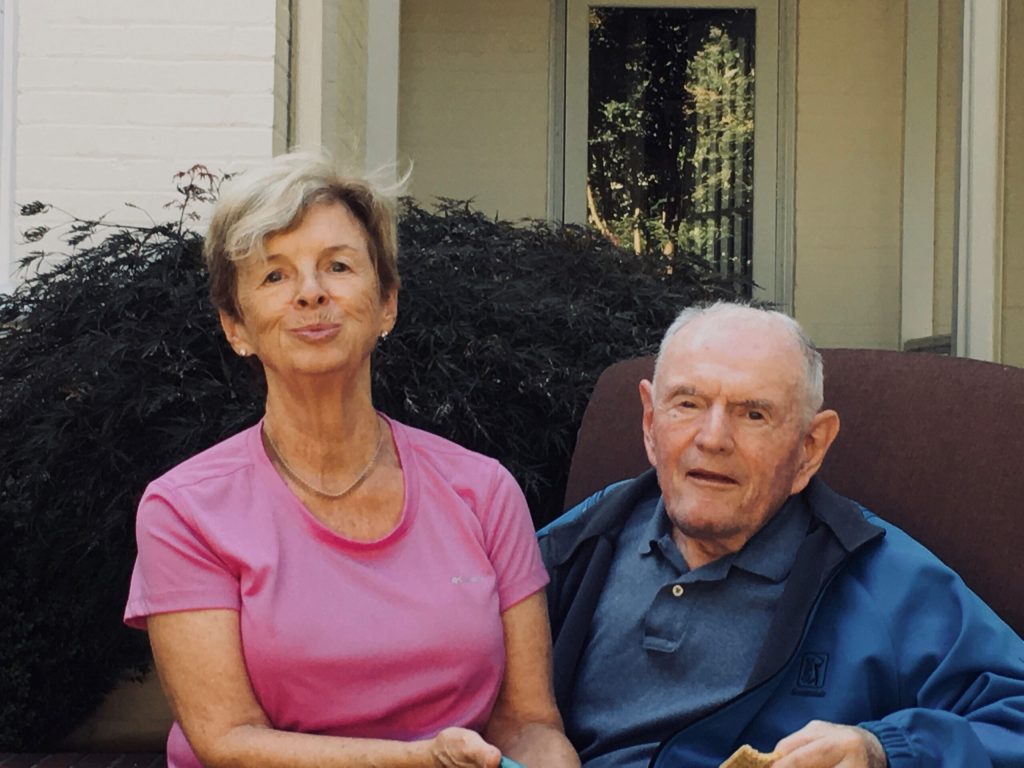
Parkinson’s Disease and the Perfect Golf Swing: Reflections on my Dad
The earliest memories I have of my dad are of him practicing his golf swing in front of a mirror. It was a beautiful golf swing, perfected through hours upon hours of repetition. He loved the game. He was very physically fit, as a U.S. Marine. He would routinely do 100 push-ups and then run around the neighborhood in his black Marine Corps boots to assure he kept his callouses for reserve weekends. It was the late 1960’s.
He must be a great player, I thought. It took me a few years to realize that my dad did not play golf.

My dad was the oldest son of Irish immigrants. At the age of 18, two weeks into his freshman year at Iona College, my dad received the news that he had a new sibling, a brother. This brother, his youngest, was born with Downs Syndrome. This news would impact my dad’s life in ways he couldn’t have imagined.
After his time at Iona, my dad had a brief stint in the business world while continuing in the Marine Corps Reserves. He soon realized his calling and enrolled in graduate school at Columbia University, eventually earning his PhD of Special Education at Teachers College. By this time, he had married my mom and had three children. We lived with my maternal grandparents in their basement, as one multi-generational family. Dad worked full time while he completed his degree at night. When he had a precious two minutes alone, he would practice his swing in the mirror. He spent many of his weekends on the golf course – working as a caddie, to make ends meet. My dad still tells the story of the well-heeled members at Westchester Country Club asking for “the PhD” to carry their bag.
Dad completed his graduate studies, began his career in public education and bought his first house. He changed the oil in his old Volkswagens and tuned up the lawnmower to save money. As he pushed the mower past the picture window at the front of our house, he would stop and practice his golf swing in the reflection, so he would be ready for the day when he had the time and resources to play.
Sometime in the early 1970’s, my memories become more vivid. My “normal” life as a child entering early adolescence was being shaped by my remarkable parents and a unique set of experiences. My mom and dad now had four kids. My mom was a per diem hospice nurse raising four precocious kids while my dad taught Special Ed classes. Dad’s early work experiences in the public school system led him to recognize that the parents of children with disabilities had few support options when the school year ended. So he created Camp Cayuga, a summer day camp for children with disabilities. It was a family affair. My mom was the Camp Nurse, and I made bologna sandwiches and jugs of tang every morning. We all served as counselors running small stations of games and activities. These early life experiences proved to shape the character of me, my brothers and sister in ways that define us as adults.
Wednesdays
My mom would pick us up after school every Wednesday to spend the afternoon with my maternal grandparents. We would stay until after dinner and drive home. My grandfather was a butcher. We would stop at the market where he worked and I would get dropped off. I would put on a white apron and spread saw dust on the floor and hope he would give me something to do with a knife!
We would then join my mom, my grandmother and my great grandmother at my grandparents’ modest home. My great-grandmother was old and frail and left Brooklyn for my grandparents’ house in Connecticut when my great-grandfather passed away. She had her own domain and was proud of her possessions, albeit they fit in one small bedroom.
I was her oldest great-grandson and she would invite me into her bedroom and regale me with stories of her childhood in Genoa, Italy and my great-grandfather. She was so proud of my mom and her work as a hospice nurse. At the end of her life, my great-grandmother reverted to speaking Italian. I did my best to nod and follow along. We all cared for her on Wednesdays, and my grandparents cared for her the rest of the week. It was all I knew…family cared for family.
Eventually I realized that my dad was never with us on the Wednesday visits. I came to learn that my dad went into the city after work every Wednesday night to care for a developmentally disabled adult named Jim. Jim lived by himself on the upper east side of Manhattan. He had a full time, live-in caregiver named Virgie. Jim was from a wealthy family and lawyers and accountants managed Jim’s affairs. My dad took Jim to the movies, to a ball game or simply sat with Jim in his apartment so that Virgie could have a night off. I learned that this engagement started when Jim’s family could not make the time to care for him and they found my dad to be a well prepared respite option. My dad was Jim’s best friend. He was paid a small fee and had his expenses covered. He continued this Wednesday night ritual for over 30 years until Jim passed away. It was not about the money; it was exhausting to drive home from NYC at midnight, then get up and go to work the next morning. My dad did it for Jim.
No Time to Smell the Roses
Over the next 30 years, my dad would rise to become the Superintendent of Schools in a prestigious town in New Jersey. My siblings and I all went off to college and began our own careers. Throughout this time, my dad was an invaluable resource to his mom, dad and brothers in guiding the management of his youngest brother, helping to navigate social services, education and eventually work programs with the objective of socializing and mainstreaming his brother’s experience. My dad led the creation of a group home established by the State of New Jersey and the families of other developmentally disabled adults to form a public-private partnership to allow these adults to be in their community. Later in life, my mom and dad became heavily invested in the transitions of my grandparents, as well. Caregiving was a constant in their lives.
When my dad retired from the NJ Public School System, he had planned to play a lot more golf. He joined the club in his community and would bring his children and grandchildren out to play. Within six months of his retirement, my dad was diagnosed with Parkinson’s disease. He was 60. He played as much golf as he could, but slowly lost his coordination and the swing – perfected in the mirror throughout his decades of self-sacrifice – began to drift away.
Most people would have quit golf by now, maybe even quit life after two decades with this disease, but if you have read this far, you know my dad is not “most people.” He begrudgingly takes help from my mom, from the personal care assistants that help in their home, and from his children to accomplish the most menial of tasks. The word “quit” is not found in his dictionary.
My mom and dad are partners. She is his full time caregiver, and she amazes all of us. It’s like she’s 79 years old, going on 60. Spry and purposeful, she holds him accountable for the actions he can still manage on his own. She has forced him to test his mobility traveling across the country and back to attend every possible high school and college graduation with her as proud grandparents. My siblings and I travel to their home in South Carolina more frequently to aid in cutting up his food, trips to the bathroom and shower, basic ambulation to and from the bedroom, the living room, or the car for a haircut or church. But make no mistake…my mom is the superhero. She regularly points out that it is her privilege to care for him, as he spent his life giving of himself to everyone: family, friends and people he did not know…at the expense of himself.
The next generation is intently observing as their grandfather grunts with determination to climb into bed the same way he did for his 99th and 100th pushups 55 years ago. He is a warrior. His grandchildren have observed the progression of the disease. They recognize his courage and toughness. They emulate his resolve in their own pursuit of academic and athletic achievements. When they are with their grandfather, they fight to be the one by his side helping with his daily activities. We as parents are proud that they care for their grandfather and proud of the love and adoration they show their grandmother.
One Great Swing
12 years into his diagnosis, I convinced my dad to come out and play nine holes with me and my son. My son was an aspiring young golfer and he really want to show his papa how well he could play. My dad was anxious at first, but we agreed he could ride in the cart and still have a good time. As we left the house, I overheard him discussing his medication regimen with my mom and negotiating an extra half dosage of the medication that manages his Parkinson’s symptoms. He knew this was one of his last opportunities to play the game he loved.
My son and my dad rode in the cart together. I carried my bag and walked behind them thinking about the cycle of life and family.
For the first few holes my dad could not move his body to swing the club. It was brutal to watch. Then on the 7th hole it happened: those thousands of practice swings in the mirror, a little help from the extra medication, and pure determination all collided behind a magical 7 wood shot that rolled to within two feet of being a hole-in-one. We screamed “Go in, go in!” and proceeded to launch high fives all around. My son hugged his grandfather, then helped him back to the golf cart. I was happy they drove on ahead to celebrate on the green and did not have to watch me cry as I walked behind a very proud grandfather and grandson.
That day I watched full circle as the next generation learned a series of life’s lessons, the power of example set by the ones you love and the resolve and privilege to care for family.
We got back to the house filled with three generations of family gathered for the holidays and told the story over and over again. Most were jealous they did not witness the shot. My mom beamed with pride. It needed no embellishment – he delivered the perfect golf swing at the perfect time in front of the perfect audience. I would argue that all the practice in the mirror was for that one magical swing and the lesson bestowed upon all of us that day. Family caring for family.


